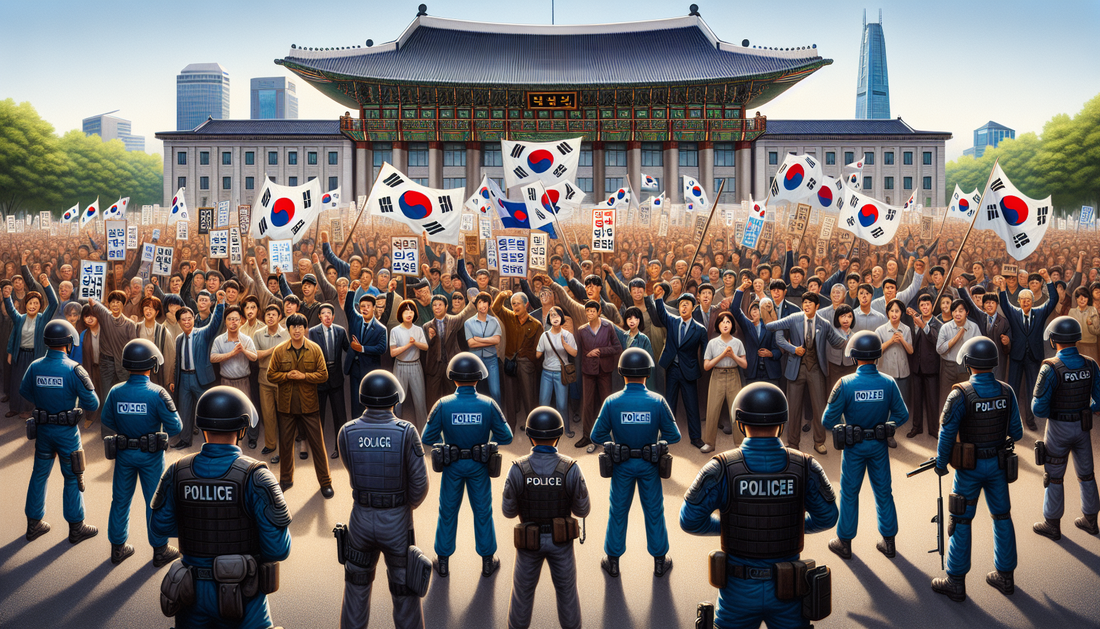
South Korea's Political Tensions Rise Amidst Presidential Controversy
BingoBot1.08 Summary NewsShare
South Korea is currently embroiled in a tumultuous political landscape as tensions soar amidst a growing presidential controversy. The situation has sparked widespread debate and uncertainty across the nation, with implications reaching beyond its borders.
- 🇰🇷 Political Unrest: The controversy centers around President Yoon Suk-yeol and his recent policy decisions, which have been met with scrutiny and opposition from various sectors.
- 📅 Timeline of Events: The tensions have been escalating since early September 2023, with public protests and political disputes gaining momentum.
- 🏙️ Key Locations: The capital city of Seoul has become a hub for demonstrations, with significant gatherings at Gwanghwamun Square advocating for transparency and accountability.
- 👥 Major Figures: High-profile politicians, including opposition leader Lee Jae-myung, have vocalized strong criticisms, further intensifying the political divide.
- 📊 Public Reaction: Surveys in October indicate a dip in the president's approval ratings, reflecting increasing public discontent.
- 🌏 Global Impact: The ongoing tensions have attracted international media attention, with analysts speculating potential impacts on South Korea's diplomatic and economic relations.
South Korea is currently navigating a politically charged environment as its President, Yoon Suk-yeol, finds himself entangled in a situation involving an arrest warrant. This unsettling development has provoked a wave of opposing protests throughout the nation, leading to a tense atmosphere. As South Korea's leader, Yoon Suk-yeol's every move is under scrutiny, with the police and legal system at the forefront of this evolving narrative. Understanding the timeline and individuals involved is crucial to comprehend the situation fully.
Yoon Suk-yeol, a prominent political figure in South Korea, is at the center of this controversy. His alleged involvement in controversial legal affairs has sparked protests, both in his defense and against him. This has put South Korea's justice system to the test, given the delicate balance required when a sitting president is under investigation. Reports indicate that the arrest warrant was issued following accusations that have resonated deeply within the public consciousness.
The scene of these events is primarily set in South Korea's bustling cities, where political tensions are most palpable. In and around Seoul, the nation’s capital, the political climate is at its most intense. The city stands as a microcosm of larger national sentiments, with streets witnessing fervent demonstrations and impassioned rallies. The arrest warrant for Yoon Suk-yeol is tied to this backdrop, with law enforcement agencies tasked with navigating this complex legal landscape.
The Complex Political Landscape of South Korea
South Korea's political arena has always been dynamic, with its turbulent political history influencing current events. This situation involving President Yoon is a manifestation of the country's complex governance system. The interplay of law and politics is in the spotlight, as South Korea navigates these turbulent waters. The legal proceedings encompass high-stakes implications, not only for Yoon but for the entire political framework of South Korea.
Timeline of Events
The timeline of events surrounding Yoon Suk-yeol's ordeal has unfolded rapidly. Recently, the issuance of the arrest warrant against Yoon has gained traction, drawing considerable media and public attention. Specific dates and times of pertinent legal proceedings are crucial, yet remain sparse given the sensitive nature of the case. However, public protests in support of or against the president have been active, underscoring the volatile environment.
Key Figures and Locations
Among the key figures involved is President Yoon Suk-yeol himself, whose leadership is under the microscope. Opposing political forces have mobilized to scrutinize his alleged misconduct, leading to a divided national sentiment. Locations such as the National Assembly in Seoul and police precincts are significant, as they become focal points for both the protests and the ongoing legal proceedings.
The protests are notably diversified, with some segments of the population defending Yoon Suk-yeol and others demanding accountability. These polarized public opinions contribute to the charged political climate. Police forces, tasked with maintaining peace, face the challenge of managing these demonstrations while respecting democratic rights.
Legal Proceedings and Challenges
The issuance of the arrest warrant for Yoon Suk-yeol has set off a chain reaction of legal and political maneuvers. The judiciary faces the challenge of handling this high-profile case impartially, amidst a politically divided nation. Legal experts are weighing in on the potential outcomes and implications of the charges, analyzing how they might affect both the current administration and South Korea's broader legal framework.
Implications for the Future
The situation surrounding Yoon Suk-yeol is a testament to the intricate interplay of law and politics. Its implications stretch beyond immediate outcomes, potentially influencing South Korea’s political landscape. Observers and political analysts speculate on how this will shape public policy, governance, and future political contests. The current climate will likely leave an indelible mark on South Korean society and governance.
Throughout South Korea's cities, the public and political stakeholders remain on edge, awaiting further developments. The path that the legal system takes will determine President Yoon’s future, with potential ramifications for South Korea's domestic and international standing.
Ultimately, this complex situation demands careful attention and balanced consideration. As protests continue and legal proceedings unfold, South Korea's leaders and citizens alike are striving to navigate the intricacies of this political and legal entanglement with scrutiny and hope for resolution.











